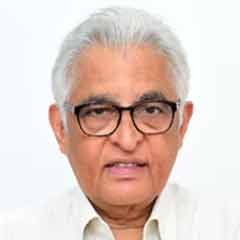Dr Swaminathan, patriarch of India’s food self-sustenance movement

Mail This Article
Dr MS Swaminathan’s face radiated a serene beauty and ever carried a gentle smile. He cherished a simple life and was mostly reticent.
I first saw Dr Swaminathan as the chairman of the jury of the Manorama Karshakasree Award selection committee in Chennai in 1992. However, our families had an extraordinary bond long before that. It all began with my grandfather K C Mammen Mappillai (former editor of Malayala Manorama) seeking the best-quality seeds for his paddy fields in Kuppappuram.
Finally, the finest of seeds were provided to my grandfather by Swami of Mankombu Kottaram Matham, a relative of Dr Swaminathan.
During the sowing season in 1920, my grandfather decided to gift a Karachi-breed calf to Mankombu Swami. He entrusted the task of taking the calf on a boat with my father’s brother K M Philip, who was 10 years old then. My grandfather also gave Philip an umbrella to ensure that the calf was protected from the harsh sun through the long hours of the boat journey from Kuppappuram to Mankombu.
Recalling this amusing story always brought smiles to both Dr Swaminathan and me.

Noble goals
The selection committee for the Karshakasree Award comprised the father of India’s green revolution Dr Swaminathan and the father of India’s white revolution Dr Verghese Kurien.
The meetings were held in Chennai. Dr Swaminathan, with his extensive knowledge and experience in the agricultural sector, was named the committee’s chairman.
Malayala Manorama’s then editor K M Mathew instituted the Karshakasree Award in 1992 to honour the farming community and enhance their social standing. Dr Swaminathan continued to be the committee's chairman from 1992 until 2020, till his health failed. Dr Verghese Kurien was on the committee from 1992 till 2008. Dr Swaminathan played a crucial role in setting the award criteria and ensuring that the most deserving individuals received the honour. Dr Swaminathan gave equal weightage to farmers’ commercial success and to their social commitment while engaging in farm activities.
Farming and family
Dr Swaminathan also attached a lot of importance to the principle of ‘farming as a family vocation.’ In 2008, when C M Muhammad of Malappuram was being selected for the award, Dr Swaminathan said the farmer’s wife, Shakeela Muhammad, should also share the award. This was in recognition of her efforts in adding value to their farm produce. I vividly remember Dr Swaminathan attending the event as the chief guest in Pathanamthitta despite his busy schedule. He personally took care to interact with farmers at the event. His meticulousness was evident in that he prepared a two-page note on why a candidate was selected. He would also have a scoreboard. However, the final selection was based on consensus among committee members.

No excuses
In 2018, Dr Swaminathan was undergoing treatment at the Kottakkal Arya Vaidya Sala and the committee meeting had to be held there. In 2020, he attended the meeting despite ill-health. The meeting was held at the MS Swaminathan Foundation in Chennai.
To sustain the unbreakable bond between the Karshakasree Award and Dr MS Swaminathan, just a week ago we wrote to his daughter Dr Madhura Swaminathan. She is an eminent economist based out of Bengaluru.

Vision for Kuttanad
Dr Swamithanan had rued more than once that the powers-be in Kerala were not keen to implement the Rs 2000-crore Kuttanad Package effectively. I was keen to know of Dr Swaminathan’s philosophy of life. “Alleviating hunger from India and the world,” was his answer. Dr Swaminathan laid stress on ensuring the availability of eco-friendly, high-yielding seed varieties to farmers. He also wanted to attract more youths into agriculture.
Dr. Swaminathan was, and will remain, a perpetual protagonist of the green revolution.


